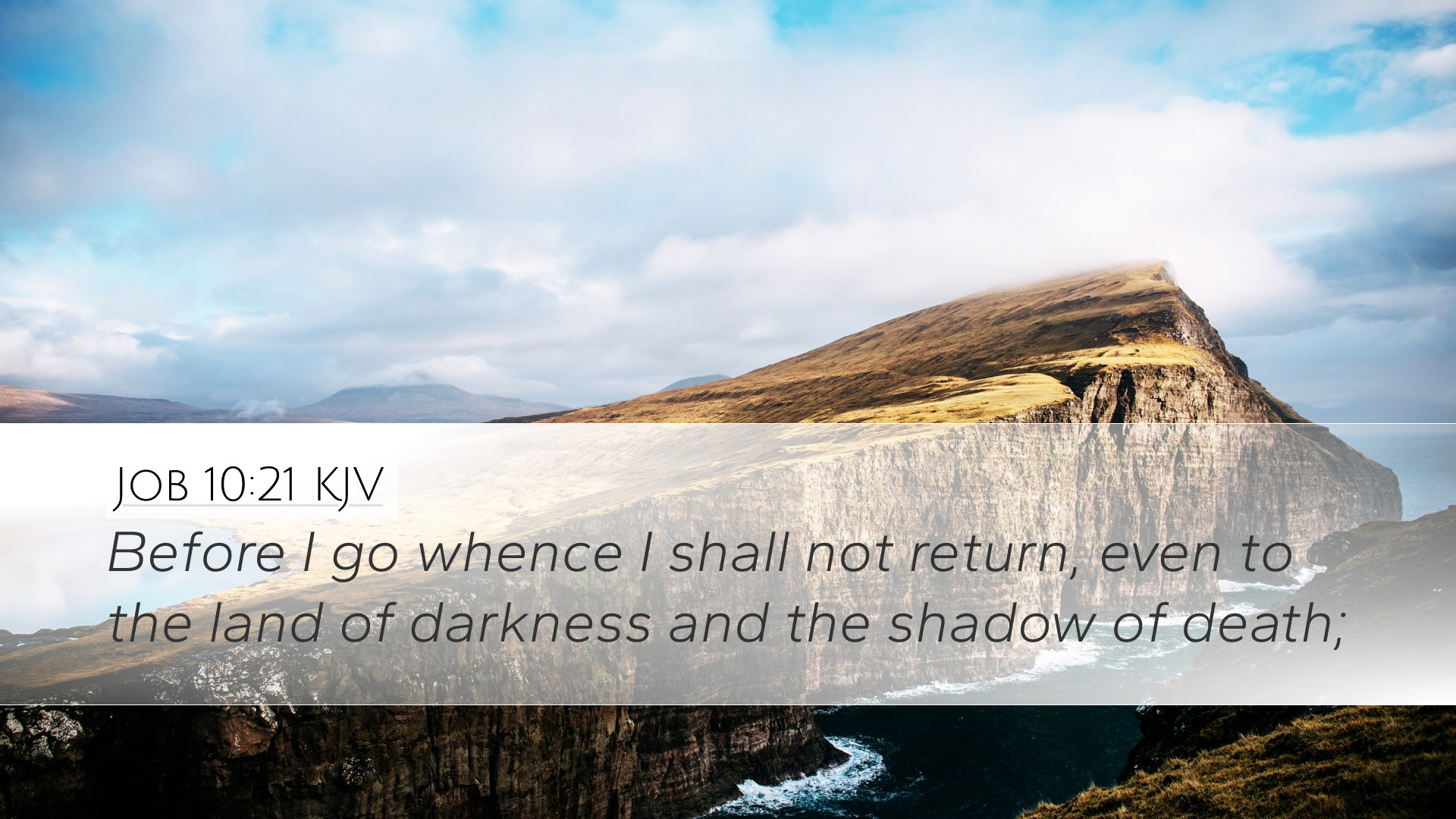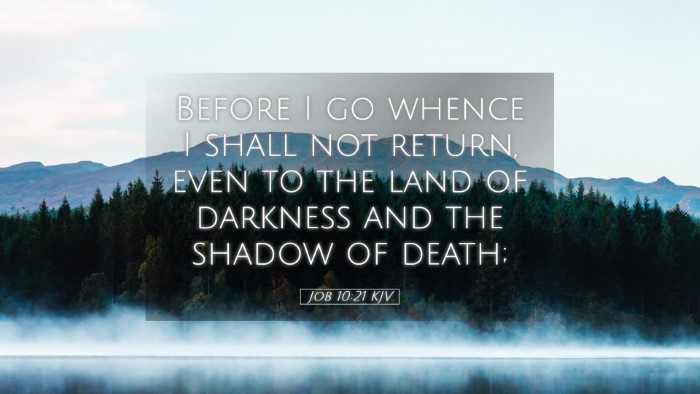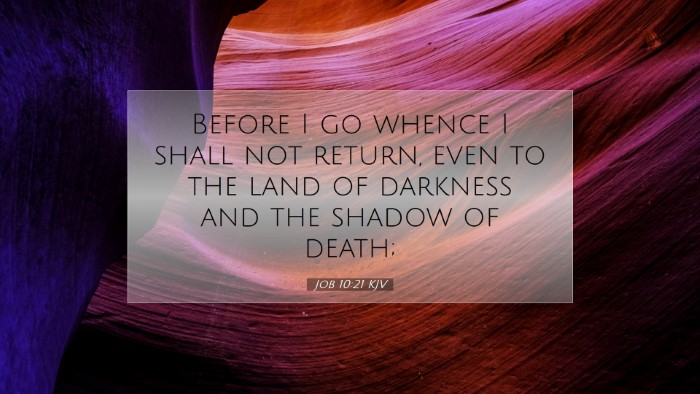Old Testament
Genesis Exodus Leviticus Numbers Deuteronomy Joshua Judges Ruth 1 Samuel 2 Samuel 1 Kings 2 Kings 1 Chronicles 2 Chronicles Ezra Nehemiah Esther Job Psalms Proverbs Ecclesiastes Song of Solomon Isaiah Jeremiah Lamentations Ezekiel Daniel Hosea Joel Amos Obadiah Jonah Micah Nahum Habakkuk Zephaniah Haggai Zechariah MalachiJob 10:21
Job 10:21 KJV
Before I go whence I shall not return, even to the land of darkness and the shadow of death;
Job 10:21 Bible Commentary
Bible Commentary on Job 10:21
Job 10:21: "Before I go whence I shall not return, even to the land of darkness and the shadow of death."
Overview
The Book of Job stands as a profound dialogue on suffering, faith, and the nature of God. Job 10:21 encapsulates Job's deep lament and reflects his yearning for understanding amid affliction. As he confronts God, he articulates his existential despair and the finality of death.
Contextual Background
Job, a blameless and upright man, has endured unimaginable suffering. His friends attempt to assert that his suffering results from his sins; however, Job maintains his innocence. This verse is nestled within Job's defense of his integrity and his plea for God’s mercy. The imagery of "the land of darkness" and "the shadow of death" signifies both physical death and spiritual alienation.
Commentary Insights
Matthew Henry's Commentary
Matthew Henry emphasizes the profundity of Job’s feelings in this passage. He notes that Job desires to communicate his plight to God before he enters a state of irreversible silence. Henry further elaborates that Job’s mention of darkness illustrates the uncertainty and fear associated with death. He reflects on the weight of Job's words, suggesting that they connote not only physical death but also a spiritual desolation in feeling distant from God.
Albert Barnes' Notes on the Bible
Albert Barnes provides a thorough examination of the verse, highlighting the significance of Job’s appeal to God. He points out that Job is acutely aware of his mortality and the transient nature of human life. Barnes suggests that “the land of darkness” symbolizes not just death, but the grave as a place where understanding ceases. He interprets Job's words as an earnest plea for divine recognition and intervention while he still lives.
Adam Clarke's Commentary
Adam Clarke delves into the emotional landscape of Job’s lament. He notes that Job addresses God directly, denoting a relationship that remains intact despite suffering. Clarke asserts that Job's reference to the land of darkness embodies a deep yearning for clarity and purpose, which he feels is lost amidst his trials. The verse resonates with human fears regarding mortality and the divine silence in the face of human suffering.
Theological Reflections
Job 10:21 invites deep theological reflection regarding the relationship between suffering, mortality, and divine presence. Various theologians and scholars reflect on several primary themes:
- The Nature of Human Existence: Job’s appeals point to the fragility of life and the inevitability of death. The struggle to find meaning in suffering is echoed throughout theological discourse.
- The Character of God: This verse raises questions regarding God’s silence and apparent distance from human suffering. The relational dynamics between humanity and the divine come to the forefront, inviting discussion about God's providence.
- The Value of Lament: Job’s bold lament serves as an invitation for individuals to voice their frustrations and grief before God. This act of lamentation is not simply permissible but can be seen as a vital aspect of faith.
Application for Today
In contemporary ministry, Job 10:21 provides a poignant framework for addressing the realities of human suffering. Pastors and theologians can utilize this passage to encourage congregants dealing with grief and alienation. Addressing tough questions surrounding God’s presence amidst pain can lead to deeper faith contexts:
- Offering Hope in Despair: Through Job’s story, believers can find a relatable figure who fought through darkness yet sought God relentlessly.
- Encouraging Honest Dialogue with God: The passage illustrates that questioning and lament can coexist with faith, inviting congregants to express their struggles authentically.
- Fostering Community Healing: Job’s experience reflects a collective journey through suffering; thus, building supportive communities that allow spaces for communal lamentation is essential.
Conclusion
Job 10:21 encapsulates the heart of human striving for meaning in the face of suffering and the mystery of divine silence. It challenges readers to engage deeply with their own experiences of pain, urging them to maintain an honest dialogue with God. The insights provided by the esteemed commentators illuminate the layered meanings of the text and provide a foundation for meaningful theological reflection and pastoral application.


